Aquaculture, also known as aquafarming, is the controlled cultivation ("farming") of aquatic organisms such as fish, crustaceans, mollusks, algae and other organisms of value such as aquatic plants. Aquaculture involves cultivating freshwater, brackish water, and saltwater populations under controlled or semi-natural conditions and can be contrasted with commercial fishing, which is the harvesting of wild fish. Aquaculture is also a practice used for restoring and rehabilitating marine and freshwater ecosystems. Mariculture, commonly known as marine farming, is aquaculture in seawater habitats and lagoons, as opposed to freshwater aquaculture. Pisciculture is a type of aquaculture that consists of fish farming to obtain fish products as food.

Fishery can mean either the enterprise of raising or harvesting fish and other aquatic life or, more commonly, the site where such enterprise takes place. Commercial fisheries include wild fisheries and fish farms, both in freshwater waterbodies and the oceans. About 500 million people worldwide are economically dependent on fisheries. 171 million tonnes of fish were produced in 2016, but overfishing is an increasing problem, causing declines in some populations.

A conventional idea of a sustainable fishery is that it is one that is harvested at a sustainable rate, where the fish population does not decline over time because of fishing practices. Sustainability in fisheries combines theoretical disciplines, such as the population dynamics of fisheries, with practical strategies, such as avoiding overfishing through techniques such as individual fishing quotas, curtailing destructive and illegal fishing practices by lobbying for appropriate law and policy, setting up protected areas, restoring collapsed fisheries, incorporating all externalities involved in harvesting marine ecosystems into fishery economics, educating stakeholders and the wider public, and developing independent certification programs.
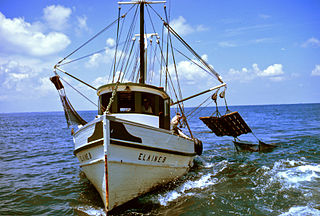
The fishing industry includes any industry or activity that takes, cultures, processes, preserves, stores, transports, markets or sells fish or fish products. It is defined by the Food and Agriculture Organization as including recreational, subsistence and commercial fishing, as well as the related harvesting, processing, and marketing sectors. The commercial activity is aimed at the delivery of fish and other seafood products for human consumption or as input factors in other industrial processes. The livelihood of over 500 million people in developing countries depends directly or indirectly on fisheries and aquaculture.

The goal of fisheries management is to produce sustainable biological, environmental and socioeconomic benefits from renewable aquatic resources. Wild fisheries are classified as renewable when the organisms of interest produce an annual biological surplus that with judicious management can be harvested without reducing future productivity. Fishery management employs activities that protect fishery resources so sustainable exploitation is possible, drawing on fisheries science and possibly including the precautionary principle.
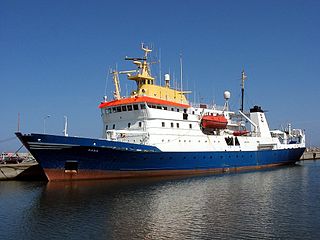
Fisheries science is the academic discipline of managing and understanding fisheries. It is a multidisciplinary science, which draws on the disciplines of limnology, oceanography, freshwater biology, marine biology, meteorology, conservation, ecology, population dynamics, economics, statistics, decision analysis, management, and many others in an attempt to provide an integrated picture of fisheries. In some cases new disciplines have emerged, as in the case of bioeconomics and fisheries law. Because fisheries science is such an all-encompassing field, fisheries scientists often use methods from a broad array of academic disciplines. Over the most recent several decades, there have been declines in fish stocks (populations) in many regions along with increasing concern about the impact of intensive fishing on marine and freshwater biodiversity.
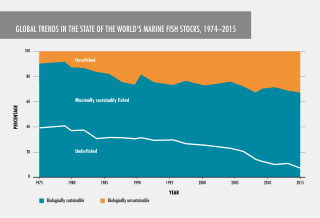
Fish stocks are subpopulations of a particular species of fish, for which intrinsic parameters are traditionally regarded as the significant factors determining the stock's population dynamics, while extrinsic factors are traditionally ignored. Stocks fished within biologically sustainable levels decreased from 90% in 1974 to 62.3% in 2021.
The Centre for Environment, Fisheries and Aquaculture Science (Cefas) is an executive agency of the United Kingdom government Department for Environment, Food and Rural Affairs (Defra). It carries out a wide range of research, advisory, consultancy, monitoring and training activities for a large number of customers around the world.
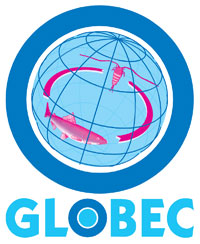
Global Ocean Ecosystem Dynamics (GLOBEC) is the International Geosphere-Biosphere Programme (IGBP) core project responsible for understanding how global change will affect the abundance, diversity and productivity of marine populations. The programme was initiated by SCOR and the IOC of UNESCO in 1991, to understand how global change will affect the abundance, diversity and productivity of marine populations comprising a major component of oceanic ecosystems.

The environmental impact of fishing includes issues such as the availability of fish, overfishing, fisheries, and fisheries management; as well as the impact of industrial fishing on other elements of the environment, such as bycatch. These issues are part of marine conservation, and are addressed in fisheries science programs. According to a 2019 FAO report, global production of fish, crustaceans, molluscs and other aquatic animals has continued to grow and reached 172.6 million tonnes in 2017, with an increase of 4.1 percent compared with 2016. There is a growing gap between the supply of fish and demand, due in part to world population growth.

The Virginia Institute of Marine Science (VIMS) is one of the largest marine research and education centers in the United States. Founded in 1940, VIMS is unique among marine science institutions in its legal mandate to provide research, education, and advisory services to government, citizens, and industry. Funding for VIMS comes from the Commonwealth of Virginia, grants and contracts from federal and state agencies, and private giving. The School of Marine Science (SMS) at VIMS is the graduate school in marine science for the College of William & Mary. VIMS offers M.S., Ph.D., and professional M.A. degrees in marine science. The school has 52 faculty members, an enrollment of 80-100 students, and includes 4 academic departments. VIMS' main campus is located in Gloucester Point, Virginia.
This page is a list of fishing topics.
A fishery is an area with an associated fish or aquatic population which is harvested for its commercial value. Fisheries can be wild or farmed. Most of the world's wild fisheries are in the ocean. This article is an overview of ocean fisheries.
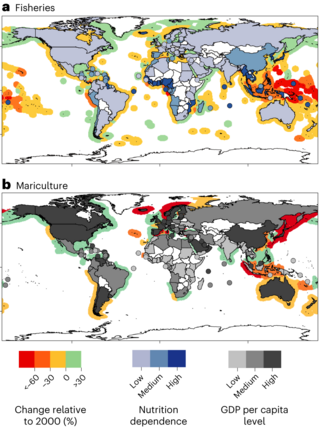
Fisheries are affected by climate change in many ways: marine aquatic ecosystems are being affected by rising ocean temperatures, ocean acidification and ocean deoxygenation, while freshwater ecosystems are being impacted by changes in water temperature, water flow, and fish habitat loss. These effects vary in the context of each fishery. Climate change is modifying fish distributions and the productivity of marine and freshwater species. Climate change is expected to lead to significant changes in the availability and trade of fish products. The geopolitical and economic consequences will be significant, especially for the countries most dependent on the sector. The biggest decreases in maximum catch potential can be expected in the tropics, mostly in the South Pacific regions.

Fishing down the food web is the process whereby fisheries in a given ecosystem, "having depleted the large predatory fish on top of the food web, turn to increasingly smaller species, finally ending up with previously spurned small fish and invertebrates".

The Institute for Marine and Antarctic Studies (IMAS) is a teaching and research institute of the University of Tasmania in Hobart, Tasmania. IMAS was established in 2010, building upon the university's partnership with CSIRO Oceans and Atmosphere and the Australian Antarctic Division in cooperative Antarctic research and Southern Ocean research.
The following outline is provided as an overview of and topical guide to fisheries:
Aquaculture in Madagascar started to take off in the 1980s. The industry includes the cultivation of sea cucumbers, seaweed, fish and shrimp and is being used to stimulate the country's economy, increase the wages of fishermen and women, and improve the regions ocean water quality. Coastal regions of Madagascar are reliant on the Indian Ocean's marine resources as a source of food, income, and cultural identity.
The Benguela Current Commission, or BCC, is a multi-sectoral inter-governmental, initiative of Angola, Namibia and South Africa. It promotes the sustainable management and protection of the Benguela Current Large Marine Ecosystem, or BCLME. The BCC was established in January 2007 through the signing of an Interim Agreement between the governments of Angola, Namibia and South Africa. Then, on 18 March 2013, the three governments signed the Benguela Current Convention, an environmental treaty that entrenches the Benguela Current Commission as a permanent inter-governmental organization.
The Fisheries and Marine Ecosystem Model Intercomparison Project (Fish-MIP) is a marine biology project to compare computer models of the impact of climate change on sea life. Founded in 2013 as part of the Inter-Sectoral Impact Model Intercomparison Project (ISIMIP), it was established to answer questions about the future of marine biodiversity, seafood supply, fisheries, and marine ecosystem functioning in the context of various climate change scenarios. It combines diverse marine ecosystem models from both the global and regional scale through a standardized protocol for ensemble modelling in an attempt to correct for any bias in the individual models that make up the ensemble. Fish-MIP's goal is to use this ensemble modelling to project a more robust picture of the future state of fisheries and marine ecosystems under the impacts of climate change, and ultimately to help inform fishing policy.











